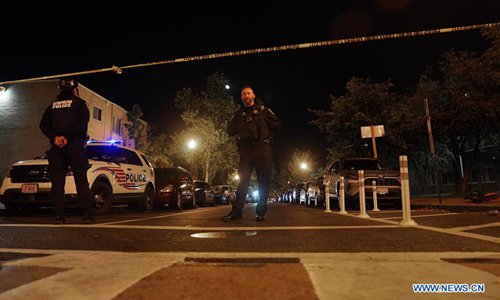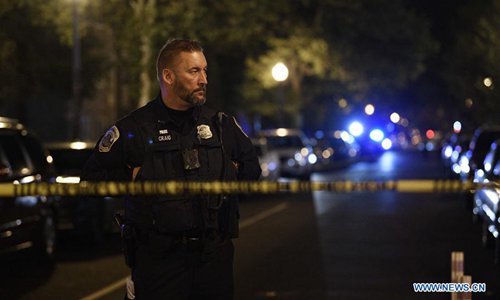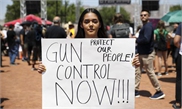
Police officers stand guard near the shooting scene in Washington D.C., the United States, on Sept. 19, 2019. One person was killed and five others were injured in a shooting Thursday night in northern Washington D.C., police said. (Xinhua/Liu Jie)

A police officer stands guard near the shooting scene in Washington D.C., the United States, on Sept. 19, 2019. One person was killed and five others were injured in a shooting Thursday night in northern Washington D.C., police said. (Xinhua/Liu Jie)
Despite the increasing frequency of mass shootings which had shocked the country, gun reform legislation in the United States remains uncertain, as bipartisan negotiations are moving slowly in Washington.
Such a seemingly endless tug of war in Washington is taking a toll on the people of the country. On Thursday night, one person was killed and five others injured in a shooting in northern Washington D.C., according to police.
"We're not moving on anything," US President Donald Trump told "Fox & Friends" early Thursday. "We're moving very slowly in one way because we want to make sure it's right."
The Republican blamed the slow progress on former congressman Beto O'Rourke, who said during last week's Democratic presidential primary debate in Houston, Texas that he would ensure mandatory buybacks for assault-style rifles, such as AR-15, if elected.
"Part of the problem that we have is because Beto O'Rourke's statement about taking away guns," Trump said. "All of the moderate Republicans and some Democrats are now afraid to do anything to go down that slippery slope."
O'Rourke has made gun legislation a key aspect of his presidential campaign since a mass shooting at a Walmart in his hometown of El Paso, Texas, left 22 dead in August.
"Here we are in 2019 and we still don't have universal background checks or 'red flag' laws or we allowed the assault weapons ban to expire, even though it did so much good and saved so many lives," O'Rourke told CNN on Wednesday.
While his proposal raises a number of legal and logistical questions, including some from Democrats, O'Rourke said that he's willing to fight.
"No one in this country, including owners of AR-15s and AK-47s, think that what is happening right now is OK," he said.
The remarks came as the Trump administration is reportedly circulating a memo on Capitol Hill describing a possible proposal to expand background checks to all advertised commercial sales, including sales at gun shows.
If someone who attempts to buy a firearm fails a background check, it would be reported to law enforcement officials, according to the memo.
Attorney General William Barr, whose department had drafted the memo, told reporters on Wednesday that the proposal does not have support from the White House.
"I'm up here just kicking around some ideas, getting perspectives so I can be in a better position to advise the president," Barr said. "But the president has made no decision yet."
A spokesperson for the National Rifle Association, a gun rights advocacy group, on Wednesday called the proposal a "non-starter."
The House passed a bipartisan background checks bill earlier this year but the Senate, controlled by the Republicans, hasn't taken up the House bill.
Senate Majority Leader Mitch McConnell said last week that the chamber is waiting for indications of what Trump is willing to sign.
Chief executives of some of the nation's best-known companies last week urged the Senate to act on gun violence.
"Doing nothing about America's gun violence crisis is simply unacceptable and it is time to stand with the American public on gun safety," read a letter signed by the heads of 145 US companies, including Airbnb, Twitter, and Uber.
There have been 40,579 gun violence-related incidents in the United States this year, in which a total of 10,737 people were killed, according to the nonprofit Gun Violence Archive.
Gun violence costs the United States 229 billion US dollars annually, amounting to 1.4 percent of the country's gross domestic product, according to a newly-released study commissioned by congressional Democrats.


